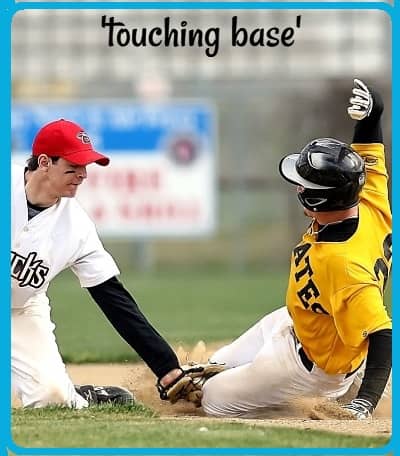Do You Know these Common Sports Idioms?
Sports idioms are so common in American speech that we often don’t think of the sport at all when using them. We ask for a rain check when a store has run out of an advertised sale item. We might encourage a friend who has a setback in his business by telling him “that’s just par for the course.”
When businessmen say “give me a ballpark figure” or “he already has two strikes against him” or “we need to touch base,” they're not thinking of a baseball game.
The expressions on this page originated with sporting events.Now they're used in many other contexts. Knowing their background can help you understand their meaning.
People use most of these sports idioms in business conversations. Many are also used in friendly conversations outside of work.
Sports Idioms from Baseball
• ‘In the ballpark’ means within a certain range or approximate value. So does ‘a ballpark figure’—an estimate of approximate size or value.
Both refer originally to balls hit within the ballpark (inside the playing field). It's less common for a batter to hit the ball completely out of the park.
• To ‘hit a home run’ means to have a major success.
In baseball, the team that is ‘up to bat’ tries to score ‘runs.’ Their players hit the ball and run from first base to second, third, and then ‘home’ base without being put ‘out’ by the other team.
Usually a runner can only reach first or second base. Then that runner moves forward as the next one hits the ball.
Hitting a home run means hitting the ball far enough that the hitter (and any teammates already on bases) can reach 'home' before the other team can get the ball there and tag them 'out.'

• To ‘touch base’ is to contact someone, often about a particular project or offer.
A runner in baseball must physically touch a base before the opposing player (guarding that base) catches or tags him with the ball.
If the runner reaches the base too late (after the baseman has the ball), he is ‘out’ and cannot score.
After three ‘outs’ the teams change places and the outfield team gets a chance to score.
• To ‘strike out’ is to fail at a project, especially near its beginning.
In baseball, a batter strikes out when he fails to hit (properly-thrown) balls three or more times. (This can include a weak hit that goes out of bounds.)
He also strikes out if a player on the opposing team catches a ball he does hit before it touches the ground (a ‘fly ball’).
• We say someone has ‘two strikes against him’ when he starts out with disadvantages. If there are already two strikes against a team, a batter has much less chance of reaching home base and scoring a point.
Unless he hits a home run, he will depend on the next player(s) to have a chance to reach home base. If any one of them is put ‘out,’ all the runners left on bases lose their positions and their chance to score.
• When someone ‘drops the ball,’ they lose an opportunity or sale they should have gotten. It's like when a baseman or outfielder catches a ball and then drops it. That usually gives the opposing players time to reach the next base or even get home.
• ‘A whole new ball game’ means a completely different situation. This expression can refer to a team catching up (no longer behind in score) rather than starting a new game.
• ‘Out in left field’ (or ‘way off base’) both mean something far from normal—often a very wrong, even wild, idea.
• A ‘rain check’ is now a note a store gives customers when a sale item runs out. It allows a customer to buy the item for the sale price after the sale is over.
We also may say 'let's take a rain check on that' when we want to meet with someone but the proposed date won't work. The term comes from baseball games in the 1800s. They gave free tickets to another game when they had to cancel a paid-for game due to rain.
• A ‘team player’ concentrates on what's good for his team. He cares more about winning than about looking good or advancing himself. The expression is used a lot in business as praise for people who work well with others.
All these baseball idioms are quite common in business conversations.
Idioms From Other Sports

• ‘The ball is in your court’ means that it’s your responsibility to make a decision and act. (It often also means that the speaker or others involved cannot act until you do.)
This probably comes from tennis. Once the ball is on one side of the net the players on the other side must wait until it is hit back to them before they can play.
• ‘Par for the course’ is an expected or usual result-- or the difficulties we can expect when we take on a project. ("Don't take it so hard. Losing your first contract is par for the course when you first learn to negotiate!")
The expression comes from golf. Par is the usual score a good golfer would earn on each hole or the entire course.
• ‘Saved by the bell’ means a last minute reprieve from a bad situation. It comes from boxing.
In a boxing match, if a boxer is knocked down and cannot get up again in a certain amount of time, he loses the match. If the bell marks the end of a round before the count ends, it saves him from losing.
• In a relay race, several runners from the same team take turns running. The current runner passes a small rod—the ‘baton’-- to the next runner without slowing down. It’s a difficult maneuver.
So ‘passing the baton’ is when the current leader gives the main responsibility for a project to someone else. “Don’t drop the baton!” is encouragement to be ready to take responsibility and do your part so your team will have a chance to win.
Sports Idioms as Election Metaphors

After the unexpected results of the November 2016 American elections, President Obama made a speech. He used several sports idioms and terms as metaphors for the election process.
He talked about
- the arena (the place where a game is played),
- a baton hand-off,
- intramural (within a team or group—for example, a practice game),
- a relay (race),
- rooting for a team (cheering for it or encouraging it to win),
- scrimmage (an American football term for playing time),
- and team, which he mentioned seven times.
(The two candidates also used some sports metaphors. Trump in his victory speech talked about competitors and superstars. Clinton in her concession speech mentioned ‘team’ three times.)
Obama used the metaphor of a relay race as his core message. He said that Americans need to pull together as one team, because we win or lose together.
He finished: “I’ve said before, I think of this job as being a relay runner. You take the baton, you run your best race and hopefully by the time you hand it off, you’re a little further ahead, you’ve made a little progress.
And I can say that we’ve done that and I want to make sure that handoff is well executed because ultimately we’re all on the same team.”
P.S. If you’re interested in more information on relay races and passing or dropping the baton, see this explanation.
You might also be interested in this video about the American relay team at the 2016 Rio Olympics.
OTHER Idiom Pages
This alphabetical list of idioms can help you learn the meanings of these very common (but sometimes confusing) expressions.
Recognizing these common idioms will make it easier to understand English conversations (and books, emails, and lectures as well!)
These phrasal verb and idiom examples show how to use these common expressions in several types of conversations.
Home> Common Idioms> Sports Idioms
Didn't find what you
needed? Explain what you want in the search box below.
(For example, cognates, past tense practice, or 'get along with.') Click to see the related pages on EnglishHints.
| site search by freefind | advanced |









